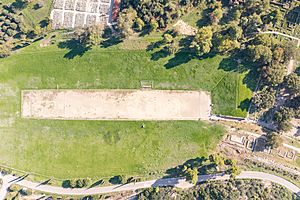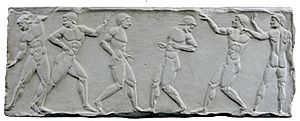Olympiad facts for kids

An Olympiad is a special period of four years. It is mainly connected to the ancient and modern Olympic Games.
Even though the ancient Olympics started a very long time ago in ancient Greece, people didn't start keeping a clear list of winners until a historian named Hippias. Later, another historian named Ephorus was the first to use the Olympic Games to mark time on a calendar.
Historians agree that other Olympic Games happened before the race won by Coroebus. However, they weren't sure how many. It was decided that Coroebus's win happened in the summer of 776 BC. This year became Year 1 of the first Olympiad. The second Olympiad then began with the next games in the summer of 772 BC.
For the modern Olympics, an Olympiad is also a four-year period. It starts on January 1 of the year the Summer Games are held. For example, the first modern Olympiad began on January 1, 1896. Olympiad XXXII started on January 1, 2020.
Contents
Ancient Olympic Games
Each Olympiad in ancient times began when the games were held. These games usually started around the first or second full moon after the summer solstice. Later, around 432 BC, the start date was figured out a bit differently.
People in ancient Greece used Olympiads to keep track of time. They would say an event happened in the 1st, 2nd, 3rd, or 4th year of a certain Olympiad. Even though they sometimes said an Olympiad lasted five years, it was actually a four-year period. They were just counting the start and end years in a different way.
For example, the first year of Olympiad 140 started in the summer of 220 BC. After the 2nd, 3rd, and 4th years of Olympiad 140, the games in the summer of 216 BC would begin the first year of Olympiad 141.
How Historians Used Olympiads
The historian Hippias was the first to make a full list of Olympic winners. His list is now lost, but it helped other historians figure out dates. By the time of Eratosthenes, most people agreed that Coroebus won in 776 BC.
The Olympic Games were important to all Greeks and happened regularly. This made it easy for Greek historians to use Olympiads to mark time. It was a way to date events that didn't depend on the different calendars used by each city-state.
One of the first historians to use Olympiads consistently was Timaeus in the 3rd century BC. However, for very old events, the dates given by later historians can sometimes be unreliable.
Later, in the 2nd century AD, Phlegon of Tralles wrote a book called Olympiads. It summarized events from each Olympiad. Christian writers also used this system to connect events from the Bible with Greek and Roman history.
Examples of Ancient Dates
- Sometimes, early historians used the names of Olympic winners to date events. For example, Thucydides wrote about the year 428 BC: "It was the Olympiad in which the Rhodian Dorieus gained his second victory."
- Dionysius of Halicarnassus said that Rome was founded in the first year of the seventh Olympiad, around 752 or 751 BC.
Anolympiad: Unofficial Games
Sometimes, the Olympic Games were held by groups other than the Eleians, who were usually in charge. The Eleians called these games Anolympiads, meaning "non-Olympics." But it's believed that the winners of these unofficial games were still recorded.
The End of Ancient Games
After 261 AD, records of the games become very scarce. Historians are not sure if they were still held every four years. Some winners were recorded until the last Olympiad in 393 AD.
In 394 AD, the Roman Emperor Theodosius I made the games at Olympia illegal. He saw them as a pagan (non-Christian) tradition. Even though people could have kept counting the four-year periods, by the middle of the 5th century, using Olympiads to mark time had stopped.
Modern Olympic Games
| Olympiad | First year | Last year | Host City | Country |
|---|---|---|---|---|
| I (1st) | 1896 | 1899 | Athens | |
| II (2nd) | 1900 | 1903 | Paris | |
| III (3rd) | 1904 | 1907 | St. Louis | |
| IV (4th) | 1908 | 1911 | London | |
| V (5th) | 1912 | 1915 | Stockholm | |
| VI (6th) | 1916 | 1919 | ||
| VII (7th) | 1920 | 1923 | Antwerp | |
| VIII (8th) | 1924 | 1927 | Paris | |
| IX (9th) | 1928 | 1931 | Amsterdam | |
| X (10th) | 1932 | 1935 | Los Angeles | |
| XI (11th) | 1936 | 1939 | Berlin | |
| XII (12th) | 1940 | 1943 | ||
| XIII (13th) | 1944 | 1947 | ||
| XIV (14th) | 1948 | 1951 | London | |
| XV (15th) | 1952 | 1955 | Helsinki | |
| XVI (16th) | 1956 | 1959 | Melbourne | |
| XVII (17th) | 1960 | 1963 | Rome | |
| XVIII (18th) | 1964 | 1967 | Tokyo | |
| XIX (19th) | 1968 | 1971 | Mexico City | |
| XX (20th) | 1972 | 1975 | Munich | |
| XXI (21st) | 1976 | 1979 | Montreal | |
| XXII (22nd) | 1980 | 1983 | Moscow | |
| XXIII (23rd) | 1984 | 1987 | Los Angeles | |
| XXIV (24th) | 1988 | 1991 | Seoul | |
| XXV (25th) | 1992 | 1995 | Barcelona | |
| XXVI (26th) | 1996 | 1999 | Atlanta | |
| XXVII (27th) | 2000 | 2003 | Sydney | |
| XXVIII (28th) | 2004 | 2007 | Athens | |
| XXIX (29th) | 2008 | 2011 | Beijing | |
| XXX (30th) | 2012 | 2015 | London | |
| XXXI (31st) | 2016 | 2019 | Rio de Janeiro | |
| XXXII (32nd) | 2020 | 2023 | Tokyo | |
| XXXIII (33rd) | 2024 | 2027 | Paris | |
| XXXIV (34th) | 2028 | 2031 | Los Angeles | |
| XXXV (35th) | 2032 | 2035 | Brisbane |
Counting Modern Olympiads
The Summer Olympics are officially called the "Games of the Olympiad." The first time this term was used on a poster was for the 1932 Summer Olympics in Los Angeles.
A modern Olympiad is a four-year period. The first one began on January 1, 1896. A new Olympiad starts on January 1 of any year that can be divided by four.
This means that the count of Olympiads continues even if the Olympic Games are canceled. For example, the Summer Games in 1940 and 1944 were canceled because of World War II.
However, the Olympiad count still went on. The 1936 Games were the XI Olympiad. The next Summer Games in 1948 were the Games of the XIV Olympiad. The current Olympiad is the XXXII, which started on January 1, 2020.
It's important to know that the official numbering for the Winter Olympics is different. They only count the games themselves, not the Olympiads. For example, the first Winter Games in 1924 are called the "I Winter Olympic Games," not "Winter Games of the VII Olympiad."
The 2020 Summer Games were the "Games of the XXXII Olympiad." Due to the COVID-19 pandemic, they were postponed to 2021 instead of being canceled. This was the first time the Olympics had been postponed in their 124-year history.
Cultural Olympiad
A Cultural Olympiad is a special program linked to the Olympic Games. It's meant to show off art and culture. The International Olympic Committee protects this idea.
Baron Pierre de Coubertin, who helped start the modern Olympics, wanted art to be part of the games. He set up Olympic Art Competitions in 1906. The first official art program was at the 1912 Games. Artists competed for medals in architecture, music, literature, sculpture, and painting.
Today, there are no longer art competitions. Instead, cultural and artistic events are shown through the Cultural Olympiad. The 2012 Cultural Olympiad in London was very big. It included the London 2012 Festival and events like the World Shakespeare Festival.
The Cultural Olympiad for the 2020 Summer Olympics in Tokyo was planned. However, it was canceled due to pandemic rules in Japan. An online event took its place instead.
Other Uses of "Olympiad"
The word "Olympiad" is often used to mean the games themselves, especially in English. This is a bit different from how it was used in ancient Greek, where it usually meant the time between the games.
"Olympiad" is also used for international competitions that are not physical sports. These include international science olympiads, like the International Mathematical Olympiad or the International Geography Olympiad. It's also used for mind sports, such as the Chess Olympiad or the Mind Sports Olympiad.
In these cases, "Olympiad" means a regular international competition for top participants. It doesn't always mean a four-year period. In some languages, like Czech and Slovak, "Olympiad" (olympiáda) is the correct word for the games themselves.
L'Olimpiade is also the name of many operas (about 60!) that are set in Ancient Greece.
See also
 In Spanish: Olimpiada para niños
In Spanish: Olimpiada para niños
 | Valerie Thomas |
 | Frederick McKinley Jones |
 | George Edward Alcorn Jr. |
 | Thomas Mensah |


